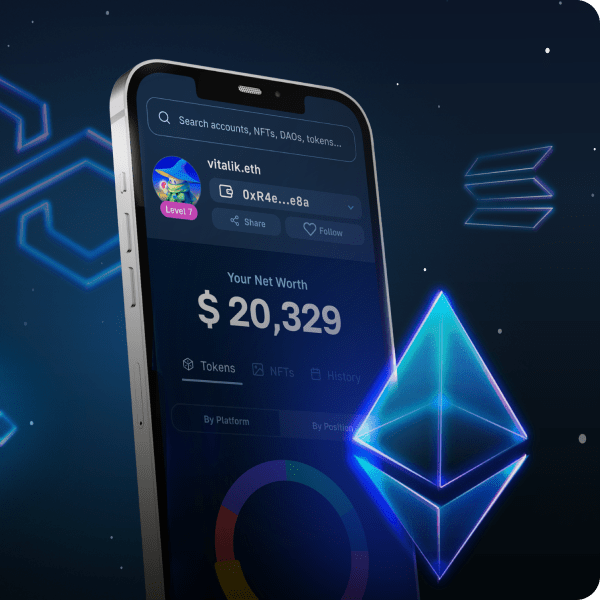Are you searching for the best QuickNode alternatives? If so, look no further! In today’s article, we’ll help decide which alternative is the best by comparing the industry’s leading Web3 API providers, including Moralis, QuickNode, and Alchemy, to see how they stack up. To highlight their differences, we used each provider’s Web3 APIs to fetch the data needed to build a portfolio view of Vitalik Buterin’s ERC-20 tokens. This allowed us to methodically compare the cost-effectiveness, efficiency, and accessibility of each provider when fetching the same on-chain data. For a quick view of the results, please take a look at the following charts:
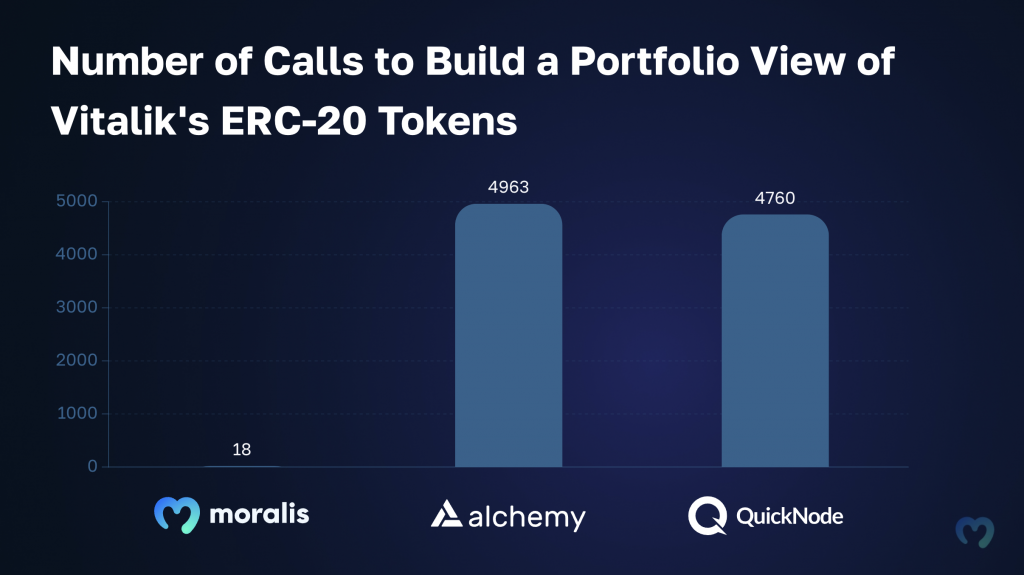
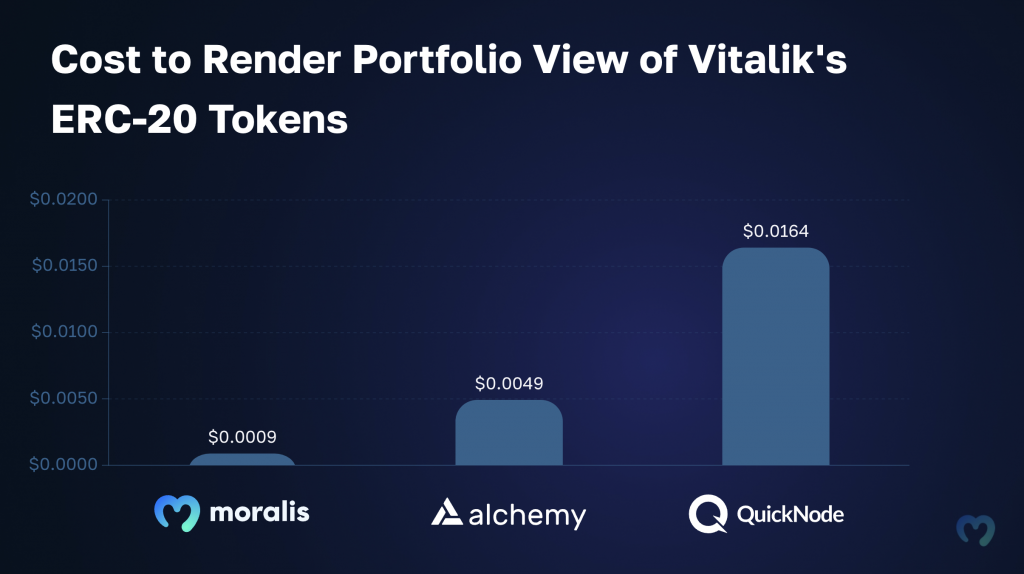
The results clearly show that Moralis is the industry’s premier Web3 API provider in terms of cost-effectiveness and the number of calls needed to render a portfolio view of the wallet. And while we used portfolio data as an example, the principles remain the same across all APIs and endpoints, highlighting the benefit of using Moralis. But for a more detailed breakdown, join us in this article as we explore the results in greater depth.
Also, are you aware that you can sign up with Moralis for free? So, if you want to start using the industry’s premier Web3 APIs, register an account immediately!
Leading Web3 APIs?
Overview
QuickNode is a prominent player in the Web3 space, offering blockchain infrastructure and API services for dapp developers. However, while QuickNode stands out as one of the industry’s leading infra and API providers, it might not be the optimal option for your development needs. So, what are the best QuickNode alternatives? Also, which API providers should you use when building dapps? For the answers to these queries, join us throughout this guide as we compare Moralis, QuickNode, and Alchemy to underscore the differences between them.
So, if you’re looking to scale an already existing dapp or want to build a new one from scratch smarter and more efficiently, then this read is for you. Let’s dive in!
What is QuickNode?
QuickNode is a well-known blockchain infrastructure and API provider within the Web3 development space. And with tools like blockchain nodes, SDKs, and Web3 APIs, QuickNode provides some of the essential features developers need to build dapps!
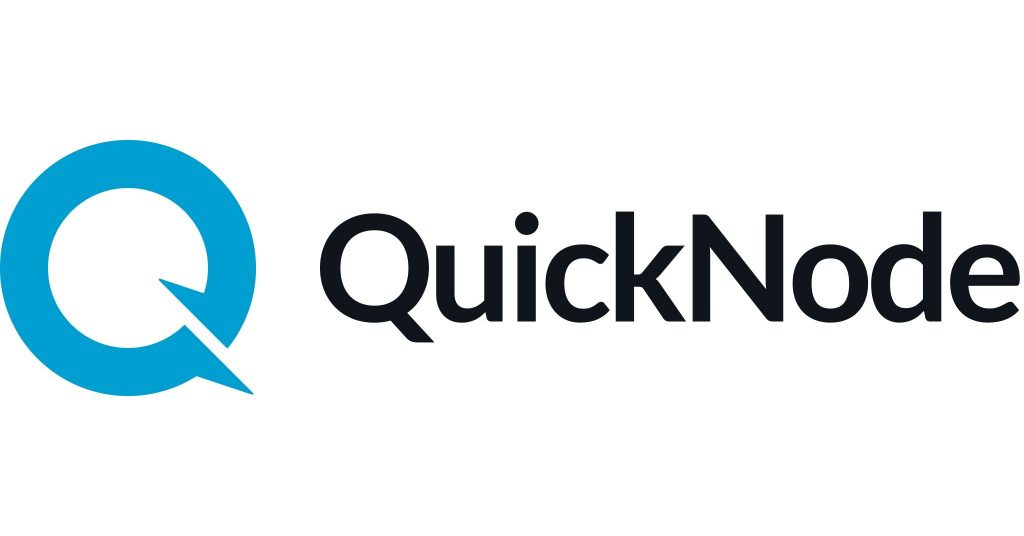
QuickNode’s suite of Web3 APIs includes a few use case-specific interfaces, including the Core API, Token API, and NFT API. These APIs allow you to fetch the on-chain data you need to develop platforms like NFT marketplaces, portfolio trackers, cryptocurrency wallets, etc.
Furthermore, QuickNode supports several blockchain networks, such as Ethereum, Polygon, Solana, Optimism, and others. As such, you can query on-chain data from multiple chains when leveraging this platform.
While QuickNode is one of the industry’s leading development platforms, it’s far from the best and likely not the optimal option for everyone. As such, in the following sections, we’ll cover the leading QuickNode alternatives to give you some other platforms and tools to consider when building dapps!
Exploring the Best QuickNode Alternatives
The industry features several prominent QuickNode alternatives, and we won’t be able to cover them all in this guide. Therefore, we’ll focus on the industry’s top two API and Web3 infra providers:
- Moralis
- Alchemy
So, let’s continue by exploring Web3’s leading API provider and development option: Moralis!
Moralis
Moralis is the industry’s leading Web3 API and infra provider, helping businesses drive growth, boost user engagement, and build more compelling user experiences. With our premier interfaces, you can seamlessly get cross-chain crypto data for wallets, NFTs, tokens, and more with single API calls!

So, why should you choose Moralis over Alchemy or QuickNode?
To answer the above question, let’s explore three unique advantages of working with Moralis!
- Streamlined Developer Experience: Moralis features a suite of use case-specific APIs, facilitating the industry’s most accessible developer experience. As such, it has never been easier to build everything from wallets to decentralized exchanges (DEXs) than when working with Moralis.
- Web3’s Most Comprehensive APIs: Our APIs are designed with the outcome in mind, minimizing the number of calls you need to fetch on-chain data. With a single API call, you get multiple data points from several sources, including metadata, market data, transaction decodings, etc.
- Unparalleled Security: Moralis is the only SOC 2 Type 2 certified Web3 infra provider. So, choose Moralis if you want to safeguard your users’ data from malicious actors.

Also, did you know you can sign up with Moralis free of charge? So, if you haven’t already, create your account today, and you’ll gain instant access to our premier Web3 APIs!
Alchemy
Alchemy is another well-known platform within the Web3 development space that stands out as a prominent option among the best QuickNode alternatives. In Alchemy’s toolkit, you’ll find blockchain nodes, SDKs, and Web3 APIs. Consequently, much like with Moralis and QuickNode, you can use Alchemy to fetch on-chain data and build dapps!
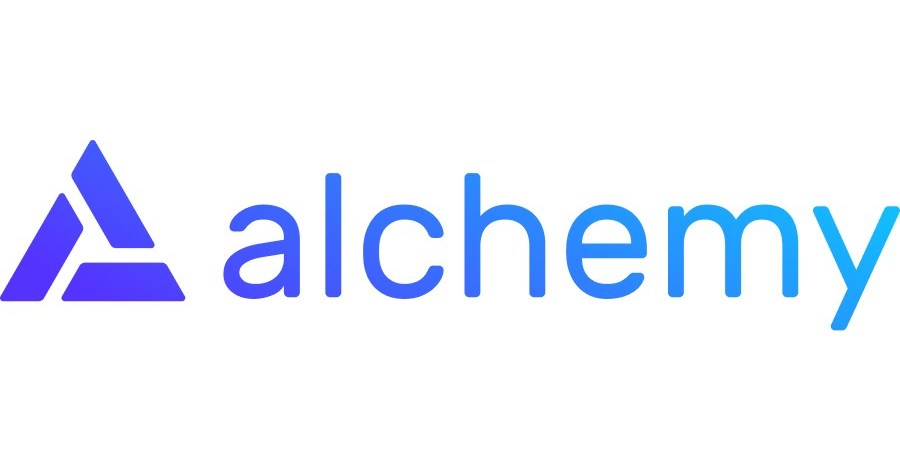
In the Alchemy Web3 API suite, you’ll find multiple interfaces, including the Transfer API, Transact API, NFT API, and others. These APIs allow you to seamlessly get data from various networks and use this information to build everything from NFT marketplaces to DeFi platforms.
Like Moralis and QuickNode, Alchemy supports several blockchain networks. Some prominent examples include Ethereum, Base, Optimism, Polygon, etc. So, when working with Alchemy, you can build dapps across some of Web3’s biggest chains.
That gives you an overview of the industry’s leading QuickNode alternatives. Let’s now compare QuickNode, Moralis, and Alchemy to see how these API providers stack up!
QuickNode Alternatives: Moralis vs. QuickNode vs. Alchemy
To compare Moralis, QuickNode, and Alchemy, we used each provider’s Web3 APIs to fetch the data required to build a portfolio view of Vitalik Buterin’s wallet. In this case, a portfolio view includes the logo, price, name, and balance of all ERC-20s held by the wallet.
This approach gave us the opportunity to evaluate and compare the cost-effectiveness, accessibility, and efficiency of Moralis, QuickNode, and Alchemy when fetching the same on-chain resources. Check out the results in the charts below:
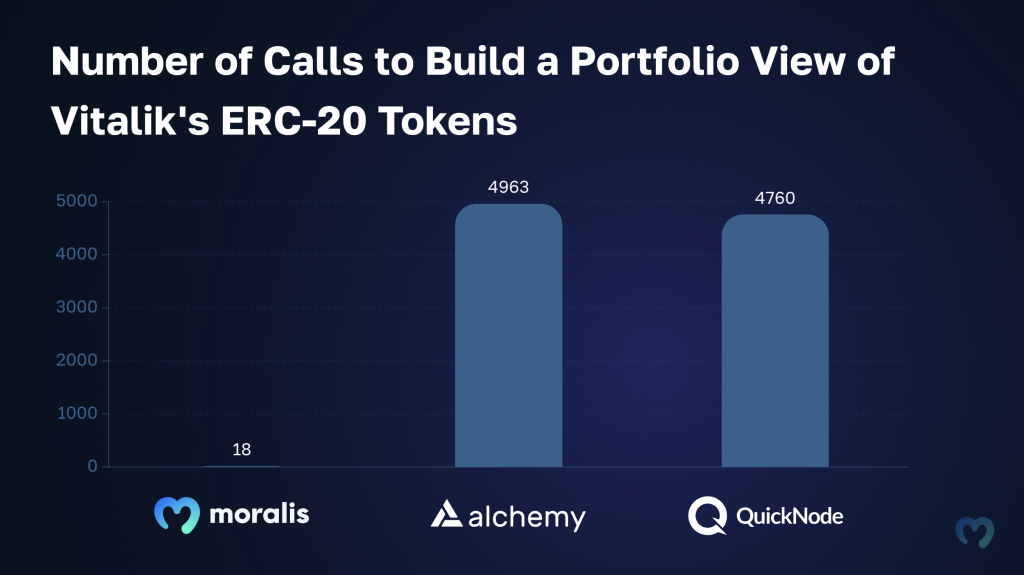
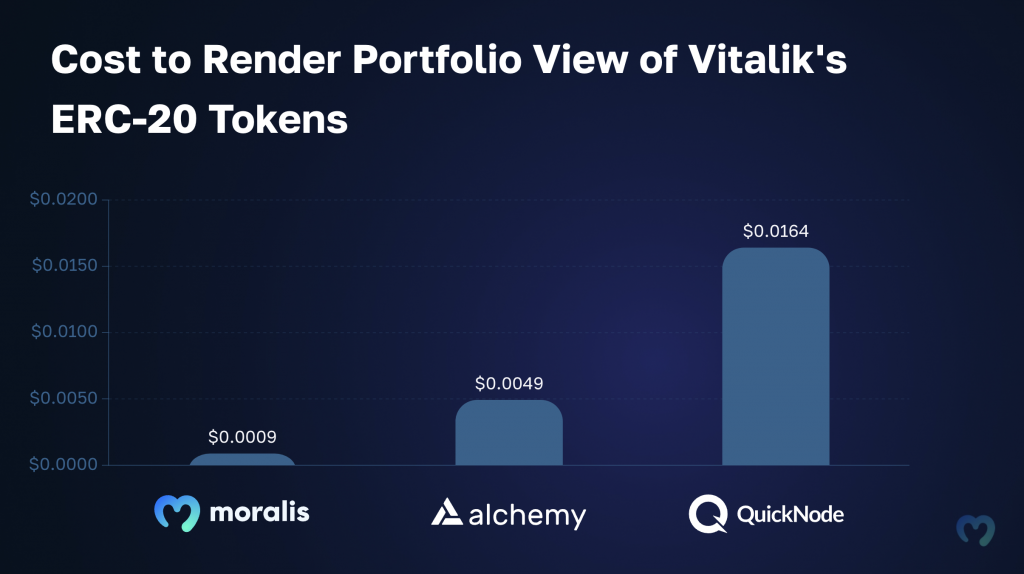
When looking at the charts, you’ll see that you only need 18 calls at a cost of $0.000882 when querying the data with Moralis. In comparison, the same task requires 4760 calls at a cost of $0.0163091 when using QuickNode. And 4963 calls at a cost of $0.0049189 with Alchemy.
But how can the results be so different?
Well, the answer is the richness of Moralis’ Web3 API responses!
With Moralis, you only need to call one single endpoint to get the data you need, including balances, metadata, and prices. In comparison, when using either QuickNode or Alchemy, you first need to call an endpoint to get the wallet’s token balances. From there, you need to call another endpoint for each token to get the metadata, resulting in thousands of additional calls. Finally, you then need to loop in a third-party provider like CoinGecko to fetch each token’s price.
If you’d like a more comprehensive breakdown of this and check out the endpoints used, read our article comparing the industry’s leading Web3 API providers.
It’s also worth noting that while this comparison used portfolio data as an example, the principles remain the same for all use cases, endpoints, and APIs. Consequently, this clearly highlights the accessibility, efficiency, and cost-effectiveness of working with Moralis compared to QuickNode and Alchemy.
QuickNode Alternatives – Exploring Moralis’ Web3 API Suite
Now that you know that Moralis stands out as the industry’s #1 option among the most prominent QuickNode alternatives, we’ll dive a bit deeper into Moralis’ suite of Web3 APIs. Our Web3 API suite comprises more than ten use case-specific interfaces, all designed to make your life as a developer as simple as possible. Unfortunately, we won’t be able to cover all of them in this guide. As such, we’ll simply focus on the following three today:
- Wallet API
- Token API
- Streams API
If you’d like to explore other Moralis APIs, please check out our Web3 API page for more information!
Streamline Data Integration with the Wallet API
The Wallet API gives you the tools to integrate wallet data and functionality into your dapps without breaking a sweat. Moreover, this premier interface supports over 500 million addresses across the biggest blockchains, including Ethereum, BNB Smart Chain, Polygon, Optimism, and many more!
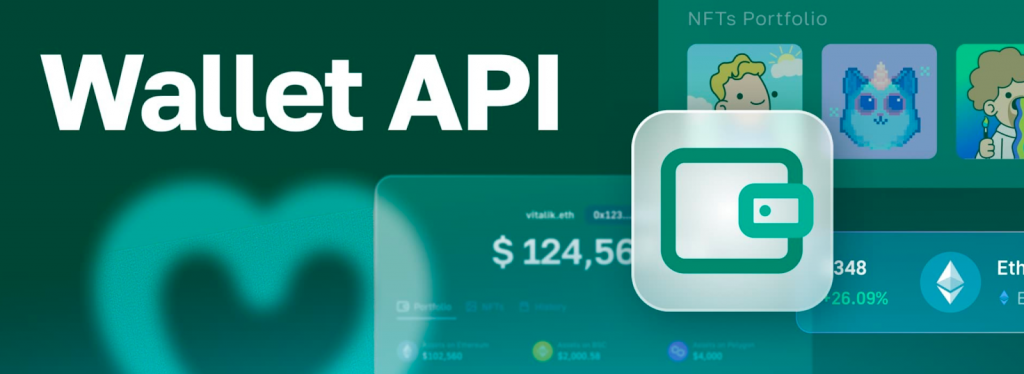
With the Wallet API, you can streamline the integration of wallet data into your dapps. This includes the net worth of any address, DeFi positions, token balances, and much more. So, when leveraging this tool, you can seamlessly build everything from wallets to portfolio trackers.
Let’s look at a brief code example to highlight the accessibility of working with the Wallet API. More specifically, we’ll show you how to get the net worth of any ERC-20 wallet:
import fetch from 'node-fetch';
const options = {
method: 'GET',
headers: {
accept: 'application/json',
'X-API-Key': 'YOUR_API_KEY'
},
};
fetch('https://deep-index.moralis.io/api/v2.2/wallets/0xd8da6bf26964af9d7eed9e03e53415d37aa96045/net-worth?chains%5B0%5D=eth&chains%5B1%5D=polygon&exclude_spam=true&exclude_unverified_contracts=true', options)
.then(response => response.json())
.then(response => console.log(response))
.catch(err => console.error(err));
You just need to replace YOUR_API_KEY, configure the parameters to fit your query and run the code. In response, you’ll get the total net worth of the wallet, along with individual values for the chains included in the query parameters:
{
"total_networth_usd": "4286806.08",
"chains": [
{
"chain": "eth",
"native_balance": "1085515469813080189177",
"native_balance_formatted": "1085.515469813080189177",
"native_balance_usd": "3550067.16",
"token_balance_usd": "735008.04",
"networth_usd": "4285075.20"
},
{
"chain": "polygon",
"native_balance": "426857449018746625825",
"native_balance_formatted": "426.857449018746625825",
"native_balance_usd": "445.31",
"token_balance_usd": "1285.57",
"networth_usd": "1730.88"
}
]
}
Improve Customer Retention with the Token API
The Token API supports every single token across the biggest blockchains. This includes meme coins like Shiba Inu, stablecoins like USDT, and everything in between. As such, when working with the Token API, you can seamlessly query all the ERC-20 data you need to build dapps!
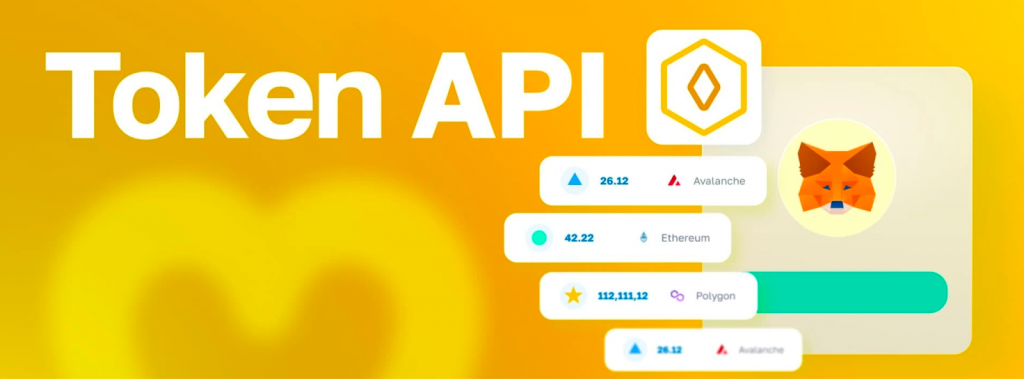
The Token API provides accurate on-chain data about ERC-20 tokens, including balances, prices, transfers, and more. With reliable data and the tools for seamlessly integrating this information, you can effortlessly boost user trust and customer retention for your dapps.
Let’s now look at an example to demonstrate the accessibility and comprehensiveness of Moralis’ Web3 APIs. In doing so, we’ll show you how to the token balances – along with prices, metadata, and more – from any wallet with a single endpoint:
import fetch from 'node-fetch';
const options = {
method: 'GET',
headers: {
accept: 'application/json',
'X-API-Key': 'YOUR_API_KEY'
},
};
fetch('https://deep-index.moralis.io/api/v2.2/wallets/0xcB1C1FdE09f811B294172696404e88E658659905/tokens?chain=eth', options)
.then(response => response.json())
.then(response => console.log(response))
.catch(err => console.error(err));
Just replace YOUR_API_KEY, configure the parameters, and execute the script. In return, you’ll get a comprehensive response containing an array of token balances, prices, metadata, and more:
{
//...
"result": [
{
"token_address": "0xa0b86991c6218b36c1d19d4a2e9eb0ce3606eb48",
"symbol": "USDC",
"name": "USD Coin",
"logo": "https://cdn.moralis.io/eth/0xa0b86991c6218b36c1d19d4a2e9eb0ce3606eb48.png",
"thumbnail": "https://cdn.moralis.io/eth/0xa0b86991c6218b36c1d19d4a2e9eb0ce3606eb48_thumb.png",
"decimals": 6,
"balance": "4553447",
"possible_spam": false,
"verified_contract": true,
"balance_formatted": "4.553447",
"usd_price": 1.001818879776249,
"usd_price_24hr_percent_change": 0.1818879776249283,
"usd_price_24hr_usd_change": 0.0018221880998897314,
"usd_value": 4.561729172660522,
"usd_value_24hr_usd_change": 0.008297236936878599,
"native_token": false,
"portfolio_percentage": 100
},
//...
]
}
Boost User Engagement with the Streams API
Moralis’ Streams API allows you to effortlessly set up streams to get customizable updates sent directly to the backend of your project via Web3 webhooks as soon as something relevant occurs on-chain. The Streams API features support for 44+ million contracts and all types of events, tokens, and wallets.
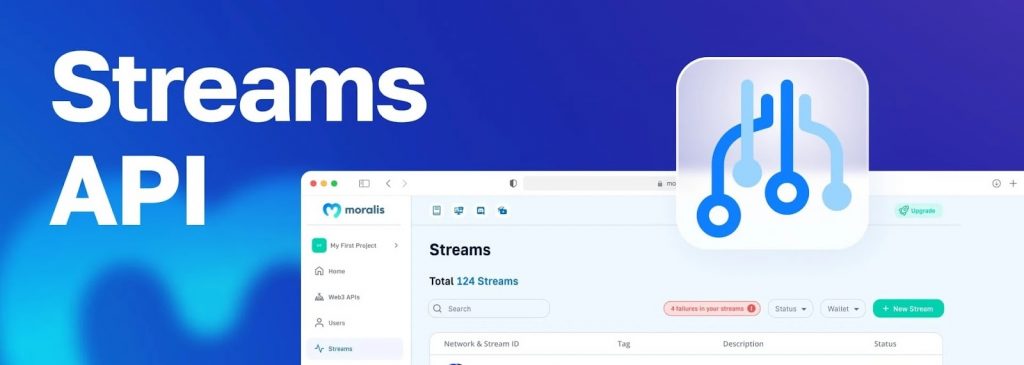
With this interface, you can now seamlessly boost user engagement by integrating real-time alerts into your dapps. As such, it’s the ultimate tool for anyone building everything from DEXs to cryptocurrency wallets!
So, how does it work?
You can set up your own stream in three simple steps:
- Step 1 – Create a streams object by selecting the chains you want to listen to, the events you wish to monitor, and specifying a webhook destination:
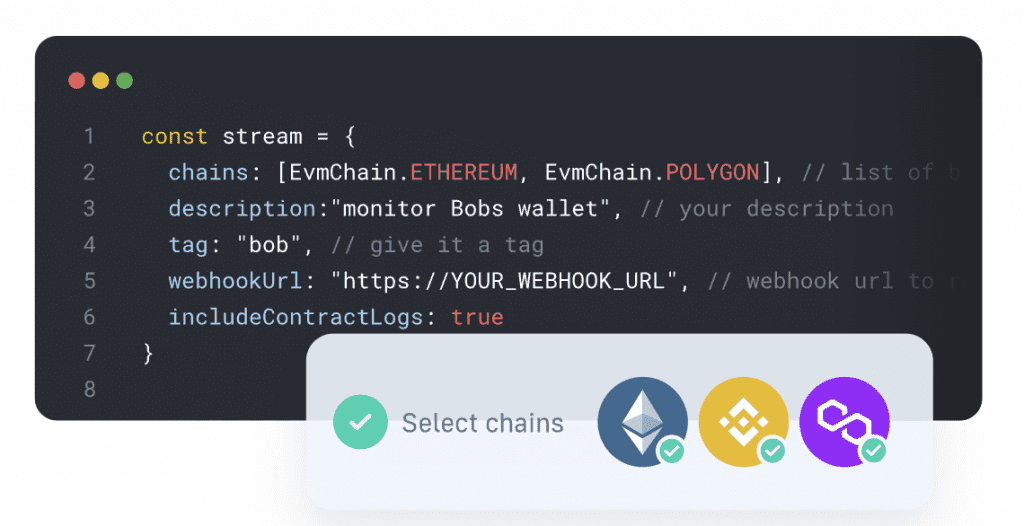
- Step 2 – Set up your stream and get a test webhook in response:
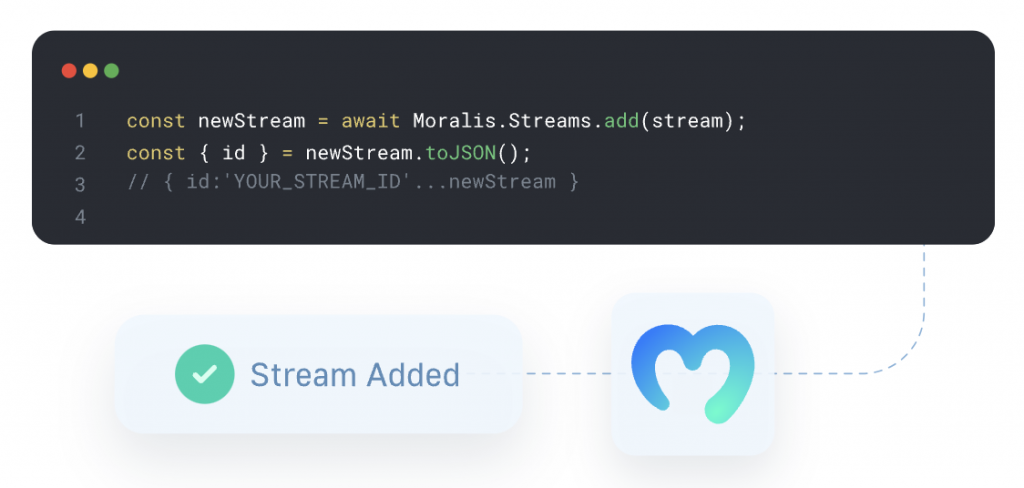
- Step 3 – Add as many addresses as you’d like, and watch the data stream in:
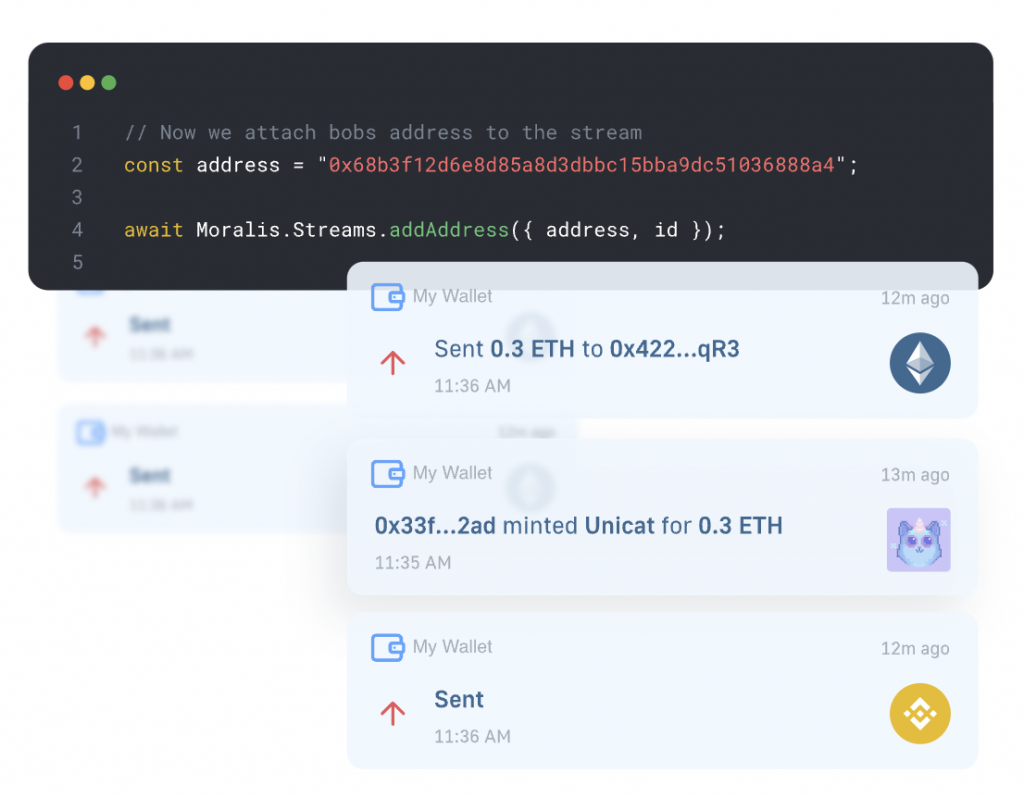
To learn more about this, please check out our Streams API documentation page!
Summary: Exploring the Top QuickNode Alternatives
QuickNode is a well-known API provider within the Web3 development space. However, while it is a solid option for developers, it might not be the best one for you. This is why we took the time to explore the best QuickNode alternatives: Moralis and Alchemy. To highlight the differences between them, we also compared Moralis, QuickNode, and Alchemy to see how they stack up!

To compare the providers, we used each of their APIs to build a portfolio view of Vitalik Buterin’s ERC-20 tokens. Our analysis showed that Moralis demands fewer API calls at a lower cost than the other competitors. This is due to the comprehensive nature of Moralis API responses, which give you all the information you need with only a single API call. Consequently, building dapps becomes easier and more cost-efficient when working with Moralis.
If you liked this QuickNode alternatives guide, consider reading more content here on the blog. For instance, check out our Alchemy alternatives article or read about SOC 2 in Web3.
Also, did you know it’s possible to sign up with Moralis for free? So, if you haven’t already done so, make sure to register for an account with Moralis straight away!
